Contents
- Introduction
- Preface
- Overview
- Relief Valve
- LECTURE 1: Why We Are In The Dark About Money
- LECTURE 2: The Con
- LECTURE 3: The Vatican-Central to the Origins of Money & Power
- LECTURE 4: London The Corporation Origins of Opium Drug Smuggling
-
LECTURE 5: U.S. Pirates, Boston Brahmins Opium Drug Smugglers
- THE BOSTON BRAHMINS
- Pirates Profiteers Banksters Traders Transfers
- Pirates
- White Slavers, Cargo, Property, Auctions, Amazing Grace
- $ Colonial Labor: Indentured Servants
- England to Philadelphia Slave Trade and Opium
- Extract from Charter of Freedoms and Exemptions to Patroons 1629
- The Definitive Treaty of Peace
- Pennsylvania Charter of Privileges 28 October 1701
- Opium Trade -- American Drug Smuggling Pirates
- Opium In America
- 1% Power Elite Networks
- 1% Elite Networks Bush & The CIA
- BEFORE Skull & Bones
- SKULL AND BONES
- Caribbean Pirates in the American South
- Who Were the Tories
- The Golden Age of Imperialism Opium Act 1908
- Global Dominance Groups
- The New World Order
- Characteristics of Fascism
- War on drugs
- Lecture 5 Objectives and Discussion Questions
- LECTURE 6: The Shady Origins Of The Federal Reserve
- LECTURE 7: How The Rich Protect Their Money
- LECTURE 8: How To Protect Your Money From The 1% Predators
- LECTURE 9: Final Thoughts
The Origins of Philadelphia's Self-Depreciation, 1820-1920 see PDF
IN 1820 Stephen Girard, the richest man in the country, was at the peak of his mercantile career. Philadelphians were dominating the Smyrna-to-Canton opium trade.
Penobscot Marine Museum - For K-12 Educators: Opium and the Opening of China
The Portuguese introduced opium to China against the wishes of the Chinese emperor. Later, England brought opium grown in India into Canton, and after 1838 the British allowed the United States to participate in the opium trade. Opium was used by British and American citizens too, and was not considered an illegal or dangerous drug at the time. In 1840-42, the Chinese fought the British in an attempt to ban opium, but were defeated. As a result of the Opium Wars England acquired Hong Kong, and four more ports opened to western trade: Shanghai, Ningpo, Foochow, and Amoy.
In 1838 the Chinese Emperor ordered a complete halt to opium traffic in Canton. He appointed a special commissioner to make sure the trade was stopped; this commissioner confiscated huge stores of the drug and dumped them into the sea. He then suspended trade with the British.
See "Captain Prescott and the opium smugglers". With illus. of the Chinese scene and period of 1840-1850, together with famous ship-masters and ships which made history on the China coast. Published 1954 by Marine Historical Association in Mystic, Conn . Written in English. Based on letters written by Captain Prescott from ports in China and India to his brother, Henry W. Prescott, in New York, and to his mother.
He mentioned the death of his Mother and the marriage of George W. Prescott, the only news. I hope George has got a good wife. Do tell me who he married.
"July 21 (1847): Hong Kong. I arrived here safe yesterday, just in season to evade a very severe typhoon which came on most furiously in an hour after I anchored. So you see, good luck to the last. At Messrs. Bush & Co., I found your overland letter of April 30.
I left Canton the 24th for Cum-sing-moon and arrived there Christmas morning, finished what little business I had with Capt. Endicott and sailed the same day for this place. When I anchored early the following morning had a visit from F. T. Bush Esq. (American Consul) who is a good fellow and my agent here.
"I always live at his house when at this place. His wife is a pleasant woman, besides their five children, and there is no place in China where I feel more at home.
It seems that the Prescott name come to the Bush Family by way of Lucy Prescott.
George Herbert Walker's great, great, great, great grandmother, born 1757 - died 1792, both Concord MA.. She married a Fay, whose father had married a Phillips. The Bush and Fay clan joined in 1859, both in their thirties, so they would be contemporaries with Capt. Prescott.
THE 1%
AMERICAN Slavers and Opium DRUg
SMUGGLING PIRATES
The 1%
1607: English colony of Virginia founded.
How colonization provoked the transportation of offenders: In 1620, Sir Thomas Smith had been allowed to ship 20 people to the Somers Islands (Bermuda). (Within a few decades, the term "being Barbadosed " came to mean being kidnapped to work on Barbados. Long later, the term was "Shanghaied".
By the 1640s, many younger people on Barbados had arrived after being kidnapped. Later, other new inhabitants Scottish and Irish soldiers captured in Cromwell's campaigns. Cromwell did much to encourage the transportation of people deemed undesirable, but not before certain trends had earlier been set by the second Earl of Warwick, his associates, and those who answered to them. Between 1623-1624 the newly organized Dorchester Company was granted permission by the Council of New England to fish and trade. By 1626 the company - with some members prominent Puritans - had established a settlement at Salem, promoting the idea of a Bible Commonwealth.
3/24/15 Barbados plans to remove the Queen as head of state almost 400 years after British colonisation The island was under the UK’s control from 1627 up until independence in 1966 and has remained a constitutional monarchy ever since. But the Prime Minister has laid down his plans for Barbados to become a republic with a ceremonial President in time for the 50th anniversary of independence 2016. “The Queen's relationship to Barbados is unique,” it continues. “In all her duties, she speaks and acts as Queen of Barbados, and not as Queen of the United Kingdom.” While acting for the island, she is officially known as "Elizabeth the Second, by the Grace of God, Queen of Barbados and of Her other Realms and territories Queen, Head of the Commonwealth". The Queen is sovereign of 15 Commonwealth realms, including the Bahamas, Barbados, Belize, Jamaica, Canada, Australia and New Zealand.
By 1629, the Massachusetts Bay Company was formed with a charter from the Crown.
Some Levant Company men investing in Massachusetts Bay Colony included Francis Flyer, Matthew Craddock, Samuel Vassall, Nathan Wright, men already active in America trade. It is difficult not to see them co-operating with "the Rich faction". The Massachusetts Bay Company members were merchants, some fishing men of the Dorchester Company, some London merchants and some Puritan gentry. (In 1630, some seventeen English ships sailed for Massachusetts, with 1000 persons plus provisions and animal stock).
1797 Canton, Massachusetts A good place for opium drug smuggling pirates
Canton was officially incorporated on February 23, 1797 from the town of Stoughton, Massachusetts. The name "Canton" was suggested by Elijah Dunbar and comes from the early belief that Canton, China was on the complete opposite side of the earth. Paul Revere built the nation's first Copper Rolling Mill in Canton in 1801. His poem entitled "Canton Dale" expresses his affection for the town. Canton is the birthplace of the Rising Sun Stove Polish Company, founded by Elijah Morse, a wealthy merchant and creator of the pot-belly stove.
Stephen Girard's Family Wealth is rooted in the Illegal Opium Drug Smuggler Trade page 290
http://www.scribd.com/doc/30660745/Opium-Traders-and-Their-Worlds-Volume-One
Start reading on page 284
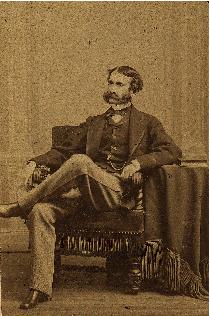 Augustine Heard and Company wikipedia.org
Augustine Heard and Company wikipedia.org
Augustine Heard & Co. was a major nineteenth century American trading firm in China whose operations consisted in importing and exporting a large array of goods, including tea and opium. founded in 1840, in Canton, China by Ipswich, MA businessman, traveler, trader and former Samuel Russell & Co. partner Augustine Heard, and his partners, Joseph Coolidge and John Murray Forbes. Throughout its history, it was run in large part by Heard family members, most notably Heard's four nephews from his brother George Washington Heard: John, Augustine, Albert Farley and George Washington Jr.
In 1841, Augustine Heard, who had previously lived in China but had returned for health reasons to Ipswich, returned to China to head the firm until 1844. There, business flourished, notably because of the use of fast clipper ships and the import of steamships. Tea, one of the main commodities traded, did not provide much profit compared to opium, which enabled the firm's finances to soar. Augustine Heard & Co. becoming the third largest American firm in China in the mid-nineteenth century. The firm also introduced steamships to China, and imported them through its sister firm in the U.S. The firm also became the main trading agent for several large firms, including Liverpool firm John Swire & Sons Limited. in 1861.
In 1844, Heard began traveling extensively, and handed control over the firm to his partners. Among Heard's partners, his four nephews were most active and ably directed the firm. John Heard led the firm until his departure in 1852; Augustine Heard II then took over the leadership of the firm and became the first Westerner permitted to trade in Siam in 1855. When his brother John returned to take the leadership again, the younger Augustine became the firm's representative to Europe. Albert Farley later took over the firm and, finally, George Washington Jr. who remained in China until the firm's collapse. The firm prospered until the 1870s when, just like its rivals, it encountered financial difficulties, and finally went bankrupt in 1875.
Augustine Heard
http://en.wikipedia.org/wiki/Augustine_Heard
Augustine Heard (March 30, 1785 - September 14, 1868) was an American entrepreneur, businessman and trader, and founder of the Augustine Heard & Co. firm in China. Augustine Heard was born in a wealthy family of Ipswich, Massachusetts merchants. His father, John Heard (1744-1834), had made his fortune by trading with the West Indies, and his half-brother Daniel (1778-1801) also worked in foreign trade with the West Indies and China. Educated at Phillips Exeter Academy in New Hampshire, Augustine did not graduate and instead, in 1803, began working for a prominent Boston, Massachusetts merchant, Ebenezer Francis. Two years later, Heard embarked as supercargo to Calcutta on one of Francis' ships. Climbing the ranks of trading companies, Heard was, by 1812, captain of his first ship, the brig Caravan. He pursued his naval career for 18 years, becoming a renowned navigator and his feats became the subject of poems and stories. In 1830, at the age of 45, Heard settled in Canton, China, where we became partner in the American trading firm Samuel Russell & Co.http://supreme.justia.com/
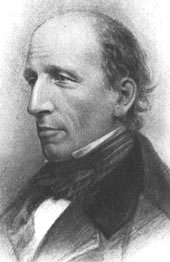 John Murray Forbes
John Murray Forbes
Forbes House built for Margaret Perkins Forbes(1773–1856) www.forbeshousemuseum.org 215 Adams Street, Milton, MA 02186 (617) 696-1815
Forbes (February 23, 1813 – October 12, 1898) was an American railroad magnate, merchant, philanthropist and abolitionist. He was president of both the Michigan Central railroad and the Chicago, Burlington and Quincy Railroad in the 1850s.
Forbes was born in Bordeaux, France. His parents were Ralph Bennet Forbes and wife Margaret Perkins, niece of Thomas Handasyd Perkins, founder of a Boston Brahmin family merchant dynasty involved in the China trade. The Forbes family settled in Milton, Massachusetts, where his father was an energetic but unsuccessful businessman who died when John was only six. His father's brother was John Murray Forbes (1771-1831), lawyer and diplomat. His cousin was Francis Blackwell Forbes, both grandchildren of James Grant Forbes I. His brother was Robert Bennet Forbes (1804-1889), sea captain and China merchant.
Forbes attended school at Phillips Academy in Andover, Massachusetts, then at Round Hill School in Northampton, Massachusetts, from 1823-28. He was one of three brothers sent by their uncle to Canton, China, and achieved some financial success during a short time spent trading in Canton. However, unlike his brother Robert Bennet Forbes who devoted himself to the China trade, Forbes returned to Boston and became an early railroad investor and landowner.
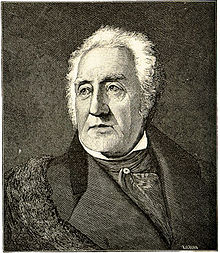 Thomas Handasyd Perkins
Thomas Handasyd Perkins
Colonel Thomas Handasyd Perkins, or T. H. Perkins (December 15, 1764 -January 11, 1854) was a wealthy Boston merchant and an archetypical Boston Brahmin. Starting with bequests from his grandfather and father-in-law, he amassed a huge fortune. As a young man he was a slave trader in Haiti, a Maritime Fur Trader, trading furs from the American Northwest to China, and then a major smuggler of Turkish opium into China.
There is a long list of names of the great American and European fortunes which were built by Opium Drug Smuggling Pirates.
The British controlled the business; perhaps a third of their Chinese revenues came from the sale of opium, though its importation had been expressly forbidden by the emperor since 1729. Massive bribery of local officials made it possible; the drug's compactness and the almost insatiable demand for it among Chinese addicts made it spectacularly lucrative. The Americans did their best to keep up with the British, but never came close to matching their earnings.
1606 London Company chartered to establish the Virginia Plantation on a communistic basis, and the Plymouth Company, whose descendants would control the New England business world. The Virginia Company refers collectively to a pair of English joint stock companies chartered by James I on 10 April 1606 with the purposes of establishing settlements on the coast of North America. The two companies, called the "Virginia Company of London" (or the London Company) and the "Virginia Company of Plymouth" (or Plymouth Company) operated with identical charters but with differing territories.
Many historians discount the American activity in the opium trade, generally concentrating on the British and their mercantilist trading syndicate, the British East India Company. Because of the Navigation Act of 1651, Americans "were not permitted to sail their own ships to the Orient," they were required as colonists and subjects to buy all their Chinese goods in London from the East India Company.
The East India Company's monopoly on the tea trade was more of a reason for the American Revolution than the cost of the tax.
Through a political arrangement, the tea was actually coming in for less than it could be bought in England. But the agitation of Samuel Adams, Ben Franklin and others had led to situation where ships were sent back to England unloaded, some cargoes rotted, other shipments were destroyed—aka, the Boston Tea Party.
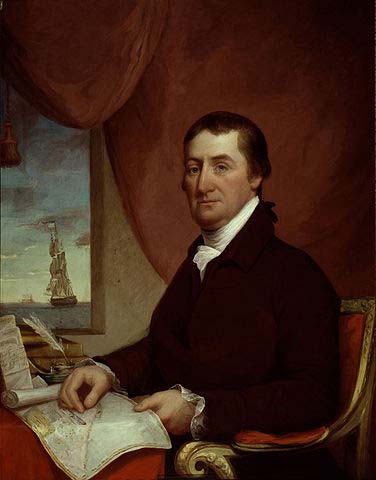 Elias Hasket Derby Pre-1783
Elias Hasket Derby Pre-1783
Salem merchant and post-Revolutionary trader US-India Elias Haskett Derby (1739-1799 a merchant privateer).
Owner of the first New England vessel to trade with China Networth USD $800 thousand at the time of his death (approximately 1/515th of US GNP)
Salem, Massachusetts merchant Elias Hasket Derby was among the first to send ships to China: "Since our last, the ship LIGHTHORSE, belonging to ELIAS HASKET DERBY, Esq. and commanded by Capt. ICHABOD NICHOLS, sailed from this port for Canton in China." (Ship News. Salem Mercury, Aug. 12, 1788.) The Salem Mercury editorialized: "We feel a degree of pleasure in saying that Robert Morris, Esq. is not the only individual, in America, of sufficient ability and enterprise to own an Indiaman and cargo. Elias Hasket Derby, Esq. of this town, has been solely concerned in several voyages to the East Indies:- The ship Grand Turk, Captain West, finished the first voyage made from New-England to Canton, in May, 1787; the ship Three Sisters, Capt. Nichols, sailed from this port in December, 1786, and was sold with her cargo in India; the bark Lighthorse, Capt. Tucker, sailed for that quarter in January 1787, and returned in January 1788; the ship Grand Turk, Capt. Derby, sailed in December, 1787; Ship Juno, Capt. Elkins, in Jan. 1789, but foundered a short time after her departure; ship Lighthorse, Capt. Nichols, last August; and the ship Atlantick, Capt. Elkins, last month:- These vessels, with their valuable cargoes, were all the property of Mr. Derby." (Editorial. Salem Mercury, Oct. 14, 1788.) "Four ships of Mr. Derby, the "Astrea," " Light Horse," "Atlantic " and " Three Sisters," were lying at Canton in the summer of 1789." Thomas Handasyd Perkins was in charge of the financial transactions. (History of Essex County, Massachusetts. Duane Hamilton Hurd, ed., 1888, p. 68.)
History of Essex County, Massachusetts / Google Books
Elias Hasket Derby's daughter, Anstiss Derby, married Benjamin Pickman (1763-1843), Harvard 1784. (The late Benjamin Pickman. Washington, DC, Daily National Intelligencer, Sep. 12, 1843.) Their daughter, Anstiss Derby Pickman, married John W. Rogers of Salem and Boston. (Deaths. Boston Daily Atlas, Sep. 2, 1856.) Their daughter, Anstiss Derby Rogers, married William Shepard Wetmore. (Married. Boston Daily Atlas, Sep. 9, 1843.) His son, John Derby, Esq., graduated from Harvard in 1786. (Historical collections of the Essex Institute, Vol. IV. Essex Institute, 1862.) John Derby was a director of the Salem Bank between 1819 and 1828.Historical collections of the Essex Institute, 1862 / Google Books
John Derby's daughter, Mary Jane Derby, married Unitarian Rev. Ephraim Peabody. Peabody was a church and business associate of Rev. James Handasyd Perkins in Cincinnati, Ohio, in the 1830s. Their son, Robert Swain Peabody, was an Overseer of Harvard and a member of the Corporation of Massachusetts Institute of Technology; and their daughter was the first wife of Harvard President Charles W. Eliot. (Ephraim Peabody (1807-1856). By Samuel A. Eliot. Harvard Square Library.)
OPIUM FLEET: THE BOODLE BOYS -- SMUGGLING WAS AND IS STILL BIG BUSINESS
American smugglers, many of them prominent merchants, were already buying tea and Chinese merchandise from the Dutch and others. The actual "tea tax" paid officially some years was very low in relation to tea that was drank. After the revolution, Americans were free to embark on their own mercantile adventures and when the East India Company outlawed their own ships from carrying opium, in 1805, American companies jumped right in. The War of 1812 caused some interruption of the trade but after the war, the Americans held a major portion of the trade for many years. EARLY SAILING SHIPS TRADING ON THE NORTHWEST COAST OF AMERICA 1788-1837
The first US ship in the China Trade was the Boston sloop Harriet; it had traded American ginseng for Chinese tea.
It didn't even get all they way to China; it traded its goods off the Cape of Good Hope. The Empress of China was especially built for the trade by Philadelphia's Robert Morris and first set sail towards China on Washington's birthday, February 22, 1784. It took ginseng and brought back teas, spices, silks, porcelains and other general household goods. There was interest in the products, a good profit was made and the China trade was off and running. Ginseng, seal and sea otter furs, and sandalwood were used to trade with the Chinese. Soon these resources were depleted and a new barter item was needed in lieu of silver—which the fledgling US had little of. In the late 1790's Smyrna (Izmer, today), Turkey a major source for opium began to become port of call for Americans.
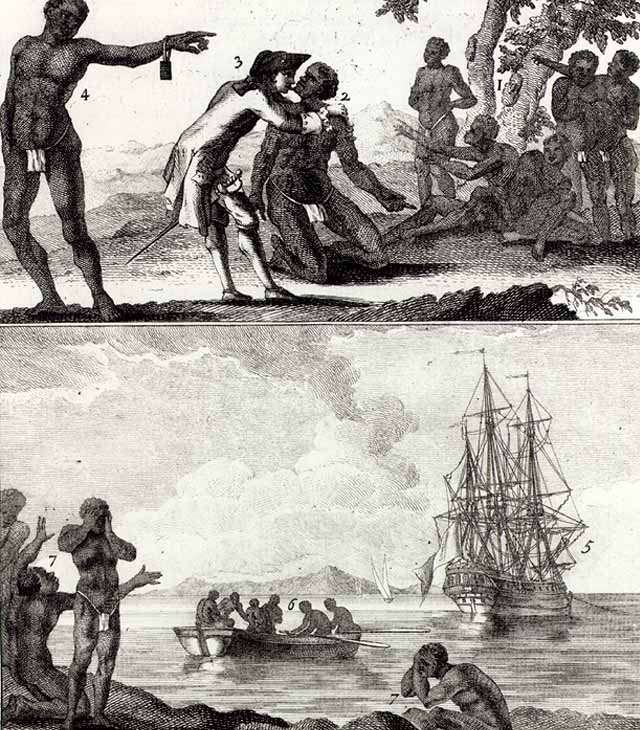 Until 1792 part of the PERKINS FAMILY SHIPPING BUSINESS, along with their CABOT relations was the slave trade. In 1789 Thomas H. Perkins first went to China with Elias Derby from Salem, Massachusetts.
Until 1792 part of the PERKINS FAMILY SHIPPING BUSINESS, along with their CABOT relations was the slave trade. In 1789 Thomas H. Perkins first went to China with Elias Derby from Salem, Massachusetts.
THE SLAVE-TRADE.
The Key to Uncle Tom's Cabin Harriet Beecher Stowe Boston: Jewett, 1854
CHAPTER IV. THE SLAVE-TRADE.
WHAT is it that constitutes the vital force of the institution of slavery in this country? Slavery being an unnatural and unhealthful condition of society, being a most wasteful and impoverishing mode of cultivating the soil, would speedily run itself out in a community, and become so unprofitable as to fall into disuse, were it not kept alive by some unnatural process. What has that process been in America? Why has that healing course of nature which cured this awful wound in all the Northern States stopped short on Mason and Dixon's line? In Delaware, Maryland, Virginia, and Kentucky, slave labor long ago impoverished the soil almost beyond recovery, and became entirely unprofitable. In all these States it is well known that the question of emancipation has been urgently presented. It has been discussed in legislatures, and Southern men have poured forth on the institution of slavery such anathemas as only Southern men can pour forth. All that has ever been said of it at the North has been said in fourfold thunders in these Southern discussions. The State of Kentucky once came within one vote, in her legislature, of taking measures for gradual emancipation. The State of Virginia has come almost equally near; and Maryland has long been waiting at the door. There was a time when no one doubted that all these States would soon be free States; and what is now the reason that they are not? Why are these discussions now silenced, and why does this noble determination now retrograde? The answer is in a word. It is the extension of slave territory, the opening of a great Southern slave-market, and the organization of a great internal slave-trade, that has arrested the progress of emancipation.
GEORGE PERKINS
A "loyalist" cousin, who fled America during the War of Independence, George Perkins was a merchant in Symrna. With a solid "connection," a strong family framework and firm financial backing, Perkins & Company became the leader in the American pack. It was a family affair.
Thomas H. Perkins was brother-in-law of Russell Sturgis, an uncle to J.P. Cushing and brothers John M. and Robert B. Forbes. Joshua Bates, a partner in Baring Brothers Bank, handled the family business in London. He was married to a Sturgis. Russell Sturgis's grandson later became Chairman of the Board of Barings.
Perkins & Co. found that illegality both in nature and operation discouraged competition and used sporadic attempts by the Chinese Government to enforce their opium prohibition, "to [build] the machinery that allowed it to control the Canton market for Turkish opium."
Perkins & Company became the first American firm to operate a "storeship" at Lintin in a new smuggling procedure. The opium was unloaded onto the "storeship," then the trading vessel would travel on to Canton with chits. The chits were then sold and the opium was retrieved later by the Chinese buyer. Smooth as silk—all illegal—but bribes were paid and business was good.
SYLPH An American Brig of 205 tons, owned by John Jacob Astor; built in 1808 and commanded by DUBELL. Also on Coast in 1819.
Samuel Russell and Phillip Ammidon
came to Canton in 1824, Russell having first been there in 1818 as a business representative for a merchant house out of Providence R.I. Ammidon went on to India to serve as the firm's opium buyer. In "a series of accidents and coincidental decisions" Russell & Company acquired a "virtual" monopoly on the American portion of the trade in the 1830's. Other eastern merchants failed, died, or retired like John Jacob Astor. Perkins & Company, resident partner in Canton, Thomas T. Forbes was drowned in August of 1829, and he carried a letter which gave Russell "charge of the firm's [Perkin's] business."
Lintin China China in Maps: 16th - 19th Century (Gallery - part 1)
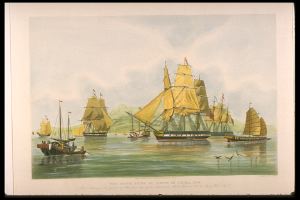
A very fine large-scale view of the Island of Lintin, located just to the north of Lantau Island and Hong Kong in the Pearl River Estuary. The Island, with its distinctive conical peak, was known as the "outer anchorage" and China trade ships halted here before proceeding onward up to Guangzhou (Canton) whilst awaiting the official measuring and paying of their fees to the Chinese Hoppo at Canton.
From 1821 the Chinese authorities prohibited the importation of opium into either Macao or Whampoa Anchorage close to Canton. As a result hulks were anchored at Lintin to act as floating depots and warehouses for the opium which was then taken by smaller vessels upriver to Canton and to other ports. Chinese opium smugglers also gathered here to take on board contraband cargoes of opium and other merchandise from the American and English Opium clippers. In the engraving we see this immensely lucrative trade at work, the American and English vessels surrounded by Chinese junks and, to the right, one of the fast Chinese opium smugglers' vessels with its large crew of oarsmen. In the 1830's Lintin became a semi-official trading base for the British in the Pearl River Estuary, a pre-cursor to the settlement of Hong Kong a decade later.
The increasing difficulties encountered by English traders with the Chinese authorities in Canton and the increasing wish to avoid the delays and restrictions engendered by directing trade through Portuguese Macao made it an ideal location. Being in the outer waters of the estuary, it was beyond the jurisdiction of both the Chinese and Portuguese authorities, yet within easy reach of the Bocca Tigris. Lintin's major deficiency however was its limited shelter in the Monsoon season which made the safer sheltered anchorage of Hong Kong to the south east of increasing significance and importance in this period. This splendid engraving is taken from an original oil painting then in the possession of John Gover Esq as the inscription below the engraving notes but now preserved in the collections of the Hong Kong and Shanghai Banking Corporation. William Huggins (1781-1845) was official marine artist to King William IV and is known for a number of other paintings of South East Asian and Far Eastern interest, including a companion painting of Whampoa Anchorage and another of Penang all of which Huggins seems to have had copied by engraver Edward Duncan as large-sheet engravings in the late 1820's and 1830's. Examples of these engravings however are of some scarcity, presumably as they were separately issued.
In the 1830's the price of opium went down and shipments of opium to China went up. The decade started out with four times the shipments of 1820 and by 1838 over ten times. The opium clipper—introduced by the Americans—with its ability to sail against the monsoons made three round-trip journeys within one year instead of taking up to two years. Profits were huge and there was a large flow of silver being introduced from China into booming western economies. In early 1837 there was a price-crash in the opium market and the speculators losses reverberated around the world in a financial panic in which specie became scarce both in Britain and the US.
August Belmont came to New York City in 1837, a stopover on his way to Havana, but stayed on in Gotham, buying securities, debts and property during the "Panic of 1837." Many say he was acting as an agent for the Rothschilds. Also in 1837 George Peabody, an old "China" trader—among other ventures—settled in London and brought into his sphere JS Morgan, progenitor of JP Morgan. Many Bonesmen were partners and principals in Morgan-related firms.
At page 3 of http://www.drugpolicy.org/docUploads/opium_india.pdf
we read that in the wake of the first Opium War of 1837 (won by Britain) ---
The Australian Tuesday 14 April 1840 page 2
The Chinese Commissioner Lin has issued a proclamation declaring that the trade with England was at an end. fl-r/OpiumWar-Newspaper.pdf
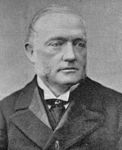 Baron Brassey of Bulkeley (1836-1918), charter member in 1902, Pilgrims Society of Great Britain, was the son of Thomas Brassey, who built railroads in England, Europe, India, Australia, Canada and the United States. Baron Brassey was a member of Parliament, 1865-1886; member, Lords of the Admiralty, 1880-1884; president, Institute of Naval Architects, 1893-1895; and Governor of Victoria Province, Australia, 1895-1900, (91,749 square miles). In 1895, Baron Brassey chaired the Royal Commission on Opium, another whitewash by the British establishment justifying their looting of China by making millions of Chinese drug addicts.
Baron Brassey of Bulkeley (1836-1918), charter member in 1902, Pilgrims Society of Great Britain, was the son of Thomas Brassey, who built railroads in England, Europe, India, Australia, Canada and the United States. Baron Brassey was a member of Parliament, 1865-1886; member, Lords of the Admiralty, 1880-1884; president, Institute of Naval Architects, 1893-1895; and Governor of Victoria Province, Australia, 1895-1900, (91,749 square miles). In 1895, Baron Brassey chaired the Royal Commission on Opium, another whitewash by the British establishment justifying their looting of China by making millions of Chinese drug addicts.
This was started generations earlier as a government approved trade based in British India. Besides cold blooded profit, the motive was to start withdrawing huge amounts of silver from China so the Crown’s international financiers could continue to control the world silver market.
Baron Brassey, Pilgrims Society, apologist for silver stealing British Opium Trade --- Pages 44-45 of the linked pdf state---
“The Royal Commission on Opium, reflecting the views of both the Government of India and most informed Indians, rejected the cultural imperialism of the opium reformers. On this issue Lansdowne and other high officials involved championed the interests of the people of India against well meaning interference. The Government of India was better attuned to Indian opinion than the opium reformers.”
That shows how depraved the British establishment and its apologists were/are---compassionate persons who wanted to end the opium business were slandered as culturally imperialistic; when in fact, it was the opium business that was imperialistic beyond belief; when Pilgrims Society member, silver stealer Viceroy Lansdowne championed opium interests, it was that of a very tiny segment of Indians; mostly Britishers residing there, and their corrupt Indian officials---not that of the majority of Indians who derived zero income from that filthy, death-dealing business!
http://www.drugpolicy.org/about/keystaff/boardofdirec/ shows this organization's current Rothschild connections; and that Pilgrims Society members George Shultz of the Treasury Department and Paul Volker of the Federal Reserve are board members!
Perseus Collection 19th-Century American Documents
HISTORY OF THE TOWN OF MEDFORD, Middlesex County, Massachusetts, FROM ITS FIRST SETTLEMENT, IN 1630, TO THE PRESENT TIME, 1855.
Charles Brooks, Ed.
Yale Manuscripts and Archives
Sterling Memorial Library
128 Wall Street
P.O. Box 208240
New Haven, CT 06520
Web: http://www.library.yale.edu/mssa/
Email: mssa.assist@yale.edu
Phone: (203) 432-1735
Fax: (203) 432-7441
Research
Medford Historical Society Papers, Volume 28
Marine Paintings and Drawings in the Peabody Essex Museum
Index to Subjects
Bold references indicate extended descriptions.
http://www.pem.org/sites/archives/mpd/mpdsidx.htm
1991 JEW of Boston
Watercolor. 17 x 23 in. (43 x 58.4 cm). signed: Camelote
Built Quincy, Massachusetts, 1831, 59 tons.
The White Swallow was an extreme clipper built in Boston in 1853 for the California trade.
http://en.wikipedia.org/wiki/White_Swallow_%28clipper%29
In 1868, Golden Fleece made a 44 day passage from San Francisco to Hong Kong, arriving three days before the White Swallow, which was known for her speed. White Swallow had left the Golden Gate with a two day head start
Marine Paintings and Drawings
http://www.pem.org/sites/archives/mpd/mpd04.htm#r0468
CAUSES OF THE GREAT EUROPEAN WAR:
It has always since the time of Henry V. been the policy of the governors of England to distract the attention of the people from home reforms by means of foreign wars. England made war on the Boers, on the Indians, on the Egyptians, on the Chinese, on'every weak race, to enslave 'them and force on them their goods, their Bibles, 'their opium and their firewater, as well as their vices. Dean Farrar said: "I shudder when I think of the curses, not but deep uttered by the races whon our fire-water' has poisoned and our vices heave degraded. " ~ E. J. Dillon pg.103 - PA's Past: Digital Bookshelf

The reason Britain did not invade America when Andrew Jackson shut down the second United States Bank,
as it had done in response to President Madison’s closure of the first United States Bank in 1811 with the War of 1812, was because
Britain deemed it lacked resources to invade both nations; that their opium business was more profitable; and they feared attacking America as long as their greatest nemesis, Andrew Jackson, was alive!
The Opium Wars, Opium Legalization, and Opium Consumption in China by Chris Feige, State Street Bank and Jeffrey A. Miron, Visiting Professor of Economics Harvard University in April, 2005 pdf
We examine the impact of China's opium legalization on the quantity and price of British opium exports to China during the 19th century. We find little evidence that legalization increased exports or decreased price.
The British East India Company exported much of this opium to China and Southeast Asia. These exports were legal throughout the 1800s even though importation into China, and consumption within China, were prohibited until 1858. Exportation occurred before this date because third party entrepreneurs AMERICAN PIRATES purchased the opium in India and smuggled it into China.
British ships began to appear infrequently around the coasts of China from 1635; without establishing formal relations through the tributary system, British merchants were allowed to trade at the ports of Zhoushan and Xiamen in addition to Guangzhou (Canton). Trade further benefited after the Qing relaxed maritime trade restrictions in the 1680s, after Taiwan came under Qing control in 1683, and even rhetoric regarding the "tributary status" of Europeans was muted.
One of the most peculiar and interesting aspects of colonialism in Asia was the opium trade.
Opium was already an important commodity in Asia when Europeans first visited Southeast Asian and Chinese ports. Europeans started to ship opium to the Far East to compete for the considerable profits associated with the trade and to barter for the silks, teas, and spices which originally motivated their travels to Asia. As the European presence in Asia evolved into extensive colonial possessions, the import of Turkish and Indian opium became a major economic activity. At points in the late nineteenth and early twentieth centuries, for example, opium tax revenues comprised much, if not most, of colonial government budgets in Malaya, the Netherlands Indies, and French Indochina. The significance of the opium trade continues to be debated. Therefore, the purpose of our paper is to offer some empirical evidence on the importance of opium to colonial-era Asia.
Silver and Opium ~ by Antal Fekete
The opium wars do not belong to the glorious episodes of Western history. Rather, they were instances of shameful behavior the West still has not lived down. Mercantilist governments resented the perpetual drain of silver from West to East in payment for Oriental goods (tea, silk, porcelain) that were in high demand in the Occident, facing low demand in the Orient for Occidental goods. From the mid -17th century, more than 9 billion Troy ounces or 290 thousand metric tons of silver was absorbed by China from European countries in exchange for Chinese goods.
The British introduced opium along with tobacco as an export item to China in order to reduce their trade deficit. Under the disguise of free trade, the British, the Spanish and the French with the tacit approval of the Americans continued sending their contraband to China through legitimate as well as illegitimate trade channels even after the Chinese dynasty put an embargo on opium imports. Because of its strong appeal to the Chinese masses, and because of its highly addictive nature, opium appeared to be the ideal solution to the West's trade problem. And, indeed, the flow of silver was first stopped, and then reversed. China was forced to pay silver for her addiction to opium smoking that was artificially induced by the pusher: the British.
Thus silver was replaced by opium as the mainstay of Western exports. In 1729 China, recognizing the growing problem of addiction and the debilitating and mind-corrupting nature of the drug, prohibited the sale and smoking of opium; allowing only a small quota of imports for medicinal purposes. The British defied the embargo and ban on opium trade, and encouraged smuggling. As a result, British exports of opium to China grew from an estimated 15 tons to 75 by 1773. This increased further to 900 tons by 1820; and to 1400 tons annually by 1838 – an almost 100-fold increase in 100 years.
Something had to be done. The Chinese government introduced death penalty for drug trafficking, and put British processing and distributing facilities on Chinese soil under siege. Chinese troops boarded British ships in international waters carrying opium to Chinese ports and destroyed their cargo, in addition to the destruction of opium found on Chinese territory. The British accused the Chinese of destroying British property, and sent a large British-Indian army to China in order to exact punishment.
British military superiority was clearly evident in the armed conflict. British warships wreaked havoc on coastal towns. After taking Canton the British sailed up the Yangtze River. They grabbed the tax barges, inflicting a devastating blow on the Chinese as imperial revenues were impossible to collect. In 1842 China sued for peace that was concluded in Nanking and ratified the following year. In the treaty China was forced to pay an indemnity to Britain, open four port cities where British subjects were given extraterritorial privileges, and cede Hong Kong to Britain. In 1844 the United States and France signed similar treaties with China.These humiliating treaties were criticized in the House of Commons by William E. Gladstone, who later served as Prime Minister. He was wondering "whether there had ever been a war more unjust in its origin, a war more calculated to cover Britain with permanent disgrace." The Foreign Secretary, Lord Palmerston replied that nobody believed that the Chinese government's motive was "the promotion of good moral habits", or that the war was fought to stem China's balance of trade deficit. The American president John Quincy Adams chimed in during the debate by suggesting that opium was a "mere incident".
According to him "the cause of the war was the arrogant and insupportable pretensions of China that she would hold commercial intercourse with the rest of mankind not upon terms of equal reciprocity, but upon the insulting and degrading forms of the relations between lord and vassal."
The peace of Nanking did not last. The Chinese searched a suspicious ship, and the British answered by putting the port city of Canton under siege in 1856, occupying it in 1857. The French also entered the fray. British troops were approaching Beijing and set on to destroy the Summer Palace. China again was forced to sue for peace. In the peace treaty of Tianjin China yielded to the demand to create ten new port cities, and granted foreigners free passage throughout the country. It also agreed to pay an indemnity of five million ounces of silver: three million to Britain and two million to France.This deliberate humiliation of China by the Western powers contributed greatly to the loosening and ultimate snapping of the internal coherence of the Qing Dynasty, leading to the Taiping Rebellion (1850-1864), the Boxer Uprising (1899-1901) and, ultimately, to the downfall of the Qing Dynasty in 1912.
1920 The Opium Monopoly by Ellen Newbold La Motte or this site
"In speaking of it as a 'monopoly' I am not employing a can't word for effect. I am not making a case. That is what it is officially styled in a certain blue book on my table which bears the title, 'Statement Exhibiting the Moral and Material Progress of India during the year 1905-'6,' and which was ordered by the House of Commons to be printed, May 10, 1907.... Now to get down to cases, just what this Government Opium Monopoly is, and just how does it work? An excerpt from the rather ponderous blue book will tell us. It may be dry but it is official and unassailable. It is also short. "'The opium revenue'--thus the blue book--'is partly raised by a monopoly of the production of the drug in Bengal and the United provinces, and partly by the levy of a duty on all opium imported from native states.... In these two provinces, the crop is grown under the control of a government department, which arranges the total area which is to be placed under the crop, with a view to the amount of opium required.' "So much for the broader outline. Now for a few of the details: 'The cultivator of opium in these monopoly districts receives a license, and is granted advances to enable him to prepare the land for the crop, and he is required to deliver the whole of the product at a fixed price to opium agents, by whom it is dispatched to the government factories at Patna and Ghazipur.' "The money advanced to the cultivator bears no interest. The British Indian government lends money without interest in no other cases. Producers of crops other than opium are obliged to get along without free money.
"When it has been manufactured, the opium must be disposed of in one way and another; accordingly: 'The supply of prepared opium required for consumption in India is made over to the Excise Department ... the chests of "provision" opium, for export, are sold at monthly sales, which take place at Calcutta.' For the meaning of the curious term, 'provision opium' we have only to read on a little further. 'The opium is received and prepared at the government factories, where the out-turn of the year included 8,774 chests of opium for the Excise Department, about three hundred pounds of various opium alkaloids, thirty maunds of medical opium; and 51,770 chests of provision opium for the Chinese market.' There are about 140 pounds in a chest.... Last year the government had under poppy cultivation 654,928 acres. And the revenue to the treasury, including returns from auction sales, duties and license fees, and deducting all 'opium expenditures' was nearly $22,000,000."
The Statesman's Year-Book for 1918, has this to say on the subject. On page 130 we read: "Opium: In British territory the cultivation of the poppy for the production of opium is practically confined to the United Provinces, and the manufacture of opium from this region is a State monopoly. The bulk of the exported opium is at present either sent to the United Kingdom, or supplied direct to the Governments of consuming countries in the Far East;
Hong Kong ceded to Great Britan where they situated a Government opium factory, 90 miles south of Canton the great opium center and port.
"Drugging a Nation," by Samuel Merwin was published in 1908